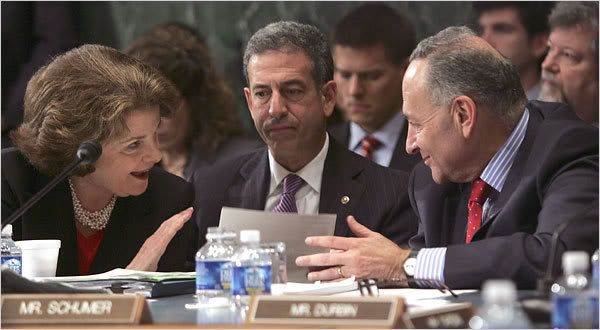Tuesday, November 6, 2007
Senate Judiciary Committee Approves Mukasey Nomination
The NY Times reports:
The Senate Judiciary Committee voted on Tuesday to approve the nomination of Michael B. Mukasey as attorney general despite opposition from most of the committee’s Democrats over Mr. Mukasey’s refusal to label a harsh interrogation technique used on terrorist suspects as torture.
Protesters opposed the Mukasey nomination and votes of two Democratic senators.
The vote, 11 to 8, with two Democrats joining all of the committee’s Republicans in supporting Mr. Mukasey, all but assured him of final confirmation by the full Senate. The Senate’s Democratic leaders are expected to schedule a vote by next week.
Mr. Mukasey, a retired federal judge from New York, ultimately owed his approval by the Judiciary Committee to the two Democrats who broke with their party to support him, Senators Dianne Feinstein of California and Charles E. Schumer, a fellow New Yorker who had initially recommended Mr. Mukasey to the White House.
The nomination of Mr. Mukasey was almost derailed by his refusal at his confirmation hearings to define as torture the interrogation technique known as waterboarding, which simulates drowning and is reported to have been used by the Central Intelligence Agency on a handful of Qaeda leaders since the Sept. 11 terror attacks.
In a letter to senators last week, Mr. Mukasey said the practice of waterboarding was “repugnant” but added that he could not judge its legality until he had been given access to classified information about interrogation techniques.
The White House welcomed the Judiciary Committee’s vote and urged that the nomination be moved quickly to the Senate floor. “Judge Mukasey has clearly demonstrated that he will be an exceptional attorney general at this critical time,” the White House spokeswoman, Dana Perino, said Tuesday.
Even some of Mr. Mukasey’s supporters said at the hearing to vote on the nomination that they were troubled by the way Mr. Mukasey handled questions about waterboarding, which the United States has fiercely condemned when carried out by other nations and had prosecuted as a war crime after World War II.
“I understand and greatly respect the view of some of my colleagues that the torture question trumps all other considerations,” Mr. Schumer said. But in explaining his vote for the nomination, Mr. Schumer said rejection of an otherwise highly praised nominee like Mr. Mukasey would allow the White House to appoint a caretaker attorney general who would not end the management turmoil and political scandals that plagued the Justice Department under Attorney General Alberto R. Gonzales.
“Judge Mukasey would be more likely than a caretaker to find on his own that waterboarding is illegal,” Mr. Schumer said.
In voting against Mr. Mukasey, the committee’s chairman, Patrick J. Leahy, and other Democrats portrayed their opposition as a defining moment for Congress in standing up to the Bush administration in upholding basic human rights and constitutional values in battling terrorism.
“America, the great and good nation that has been a beacon to the world on human rights, does not torture and should stand against torture,” Mr. Leahy said.
Senator Richard J. Durbin of Illinois, the Senate’s No. 2 Democratic leader, accused Mr. Mukasey of a “legal dodge” in refusing to repudiate “a cruel, abusive technique that has been regarded as torture in the civilized world for over 500 years.”
“When the history of this time is written, the issue of torture will define America’s values in the age of terrorism,” he continued. “Judge Mukasey’s responses to our questions on the issue of torture make it clear that he does not understand the challenge of this moment in history.”
The committee’s ranking Republican, Arlen Specter of Pennsylvania, said he had also been disturbed by Mr. Mukasey’s responses to the committee’s questions on torture, as well as on the nominee’s embrace of the Bush administration’s expansive view of the powers of the executive branch in wartime.
Mr. Specter said Mr. Mukasey’s assertion that he could not address the legality of waterboarding because he had not been briefed about it was “an excuse, and a flimsy excuse.”
But he said he decided to support the nomination after talking on Monday with Mr. Mukasey, who said he believed that if Congress outlawed waterboarding, which the Senate is now considering, the president would have no authority to overrule it. Mr. Specter said: “All factors considered, I think that the balance is decisively in favor of confirming Judge Mukasey. And I look forward to Congressional consideration of this issue of waterboarding. We’re the people who ought to decide it.”
Posted by Maeven at 9:27 PM
Labels: Arlen Specter, Chuck Schumer, Dianne Feinstein, Michael Mukasey, Russ Feingold, Senate Judiciary Committee, torture, U.S. Attorney General
